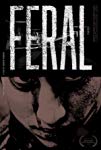Eye For Film >> Movies >> Feral (2018) Film Review
Feral
Reviewed by: Jennie Kermode

What does it mean to be human when everything is broken down to the basics? Since the 1960s, many people have promulgated romantic notions about what it's like to live outside the system, but those who actually do tend to focus on much simpler things. When one has no external source of support, life quickly becomes about finding food, trying to stay warm, getting hold of the drink or the drugs or the cigarettes that make one feel a little better and trying, if one can, to keep clean. Yazmine (Annapurna Sriram) has been living like this for years. It could be worse. She has a good place to hide, a tunnel room in part of the Metro system where nobody bothers her and she can at least keep dry. So far she has managed to avoid sex work, the very thought of which makes her recoil. But it's winter now, and although she doesn't know it, a blizzard is on the way. Soon, day to day survival might not be enough.
Politicians often complain about poor people failing to look ahead and plan for the future. Poverty cab make it difficult to see much future, and never more so than on the streets, where life is lived day to day. Andrew Wonder's close up, abrupt directorial style (remarkable for a first feature) emphasises the immediacy of the world as Yazmine sees it. She scams, she steals, she bites the hand that feeds. She doesn't trust anyone because her experience is that nobody will help her without wanting something in return, and she is herself as inherently untrustworthy as a wild animal, excepting that she's true to her nature.

Colleen Dodge's exquisitely detailed production design and Wonder's cinematography combine to present the world as a wonderland full of strange objects and mysteries, in which people behave in what are, to Yazmine, inexplicable ways. We stay close as she makes her way around it, mapping out threats and possible advantages, understanding why her room, rough though it is, feels good to return to. A scene in which she talks to a young mother in a park and hears the exhausted woman confess that sometimes she wishes her child would disappear brings home the fact that we all have something like this within us, that it takes a constant effort to live a civilised life, a tame life, especially when under pressure. Yazmine's backstory, when we hear it, is a reminder that there are predators out there - that some organs of our civilisation can seem every bit as feral, as unreasonable and unreasoning in their actions.
Sriram's performance is intense. There is no room here for any artifice. Yazmine is guarded, protecting herself emotionally as well as physically, layering on lies to avoid getting hurt, but underneath that is something childlike. She lacks the sophisticated systems of self-deception that most people use to get by. This gives her a vulnerability that's easy to spot and, together with her physical beauty (at least compared to most people living that way), makes her a target for predators - something she's all too aware of. It also makes her easy for the viewer to connect to. An incident where she's threatened by a group of young men purely for being homeless snaps us back, acting as a reminder that many people won't see her as human at all.
Every experience of homelessness is different and Wonder doesn't fall into the trap of trying to cover all the bases. Yazmine isn't part of a community. She doesn't have anyone to draw on for emotional support and she doesn't make use of state or charity services. It's just her against the world. Viewers might be reminded of post-Apocalyptic dystopias; for Yazmine, the end of the civilised world has already happened. What Wonder does is to elevate her to the status on survivors in such stories, to invite us to admire her ingenuity and ability to endure even as we fear for her. We are the outsiders here whilst she is whole, unbroken and still alive.
Reviewed on: 08 Apr 2019
















